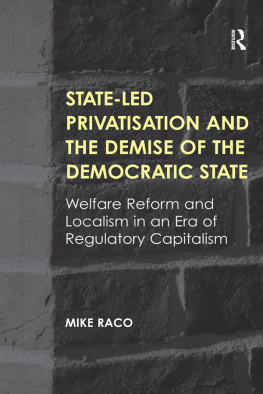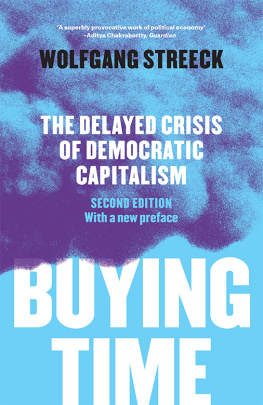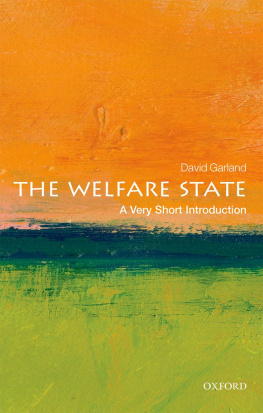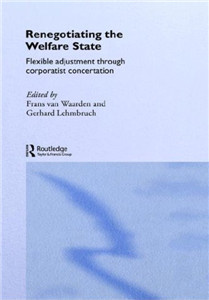STATE-LED PRIVATISATION AND THE
DEMISE OF THE DEMOCRATIC STATE
State-led Privatisation and the Demise of the Democratic State
Welfare Reform and Localism in an Era of Regulatory Capitalism
MIKE RACO
University College London, UK
First published 2013 by Ashgate Publishing
Published 2016 by Routledge
2 Park Square, Milton Park, Abingdon, Oxon OX14 4RN
711 Third Avenue, New York, NY 10017, USA
Routledge is an imprint of the Taylor & Francis Group, an informa business
Copyright Mike Raco 2013
Mike Raco has asserted his right under the Copyright, Designs and Patents Act, 1988, to be identified as the author of this work.
All rights reserved. No part of this book may be reprinted or reproduced or utilised in any form or by any electronic, mechanical, or other means, now known or hereafter invented, including photocopying and recording, or in any information storage or retrieval system, without permission in writing from the publishers.
Notice:
Product or corporate names may be trademarks or registered trademarks, and are used only for identification and explanation without intent to infringe.
British Library Cataloguing in Publication Data
A catalogue record for this book is available from the British Library
The Library of Congress has cataloged the printed edition as follows:
Raco, Mike.
State-led privatisation and the demise of the democratic state : welfare reform and localism in an era of regulatory capitalism / by Mike Raco.
pages cm
Includes bibliographical references and index.
ISBN 978-1-4094-4326-1 (hardback)1. PrivatizationGovernment policyGreat Britain. 2. Local governmentGreat Britain. 3. CapitalismPolitical aspectsGreat Britain. I. Title.
HD4148.R27 2013
338.9'25dc23
2013007755
ISBN 9781409443261 (hbk)
Contents
List of Figures and Tables
Figures
Tables
Acknowledgements
There are many people that I would like to thank in writing this book.
First, many thanks to Katy Crossan and Valerie Rose at Ashgate Publishing, along with two anonymous reviewers, who provided valuable advice on the original proposal.
I would also like to express my gratitude to staff and research students in the Cities Group in the Department of Geography, Kings College London and the Bartlett School of Planning, University College London who have given much encouragement and support. Particular thanks to Rob Imrie and Clare Herrick who provided many helpful comments and thoughts on the original proposal. Thanks also to Stuart Baldock for his inspiring Masters work on PFIs and for the support of others, who provided many thoughtful insights and criticisms over recent years. There are too many of you to name! I am very grateful to all of you for your continual encouragement, although the final text here is, of course, my responsibility alone.
I have given a number of presentations based on the arguments made here and I would like to recognise the contribution of all those who engaged constructively in discussions; and many of these discussions were certainly stimulating and lively! Particular thanks to those at various workshops at University College London, Kings College London, and the Universities of Edinburgh, Manchester, Reading, Sheffield Hallam, KTH-Stockholm, Sciences-Po Paris, Venice, and York.
I would also like to acknowledge the support of Neil Thomas Proto from the Georgetown Public Policy Institute who provided me with materials for the case study of the Virginia Highway used in . The best of luck with your on-going campaign. A big thanks to Alexandra Gomes and Stephen Lorimer in the Bartlett Faculty at UCL who carried out the statistical analysis on PFI that underpinned much of the discussion.
Thanks also to those that I interviewed during the writing process. I hope that the book does some justice to their views and thoughts.
And finally, thanks, as ever, to Sarah Read for her constant support.
Mike Raco, Petts Wood, Kent
Chapter 1
State-led Privatisation, the Restructuring of the State, and the New Localism
Introduction
For decades we have been told that we are living through a governance revolution. Gone are the days when government agencies and bureaucrats told us what to do and how to do it. We are no longer clients of the state but empowered citizens who are able to take greater control over our own lives and the activities of those who govern in our name. Across the world the prevailing narrative has become one of Good Governance, devolution, liberation, and freedom of expression. In policy fields as diverse as development planning, healthcare, and public transport a neo-pluralist rhetoric has emerged based on the principles of co-production and partnership working. All of this has been fuelled by more transparent modes of governance and aided by an information revolution that has given citizens the power to shed light on the practices of elites, in ways that were thought impossible even a few short years ago. This knowledge and scrutiny, it is often claimed, has made it impossible to hide elite practices from public view. They are held to account in new and radical ways that limit opportunities for old-fashioned forms of exploitation and malpractice. The world of governance is almost unrecognisable compared to that of the post-war decades and there has been a liberating and utopian shift from government to governance.
And yet at the same time a curious paradox is emerging. Whilst the prevailing zeitgeist is one of openness and citizen empowerment, new modes of governance are emerging in which state controls have actually been expanded into many spheres of life that were previously left unregulated. Some political scientists now characterise this as an era of regulatory governance in which states have not become smaller, as in neo-liberal visions, but larger. Even in an era of so-called austerity, state spending in many countries remains at record post-war levels. The 1990s and 2000s witnessed a mushrooming of independent state-funded agencies to enforce these new regulations. The character of democratic politics has also changed markedly. New governance programmes are frequently converted into calls for more regulation, smarter regulation, re-regulation, and independent oversight, free from the political inference of elected representatives and citizens. This logic of governance by regulation has ushered in unprecedented forms of state-led privatisation in which governments voluntarily cede their powers, responsibilities, and resources over to global companies under regulatory supervision and contract. As this book will show, the reality of this situation is that the rhetoric of Good Governance has been used to legitimate the wholesale transfer of welfare assets and services beyond the democratic control of state actors and the citizens they represent. Privatisation has become a new utopianism.
The reformation of state structures has also brought about fundamental changes in the private sector. Many private investors have realised that vast returns are to be made from state contracts. The 1990s and 2000s have, therefore, witnessed the emergence of what Claire Cutler (2003) terms private international regimes who not only strive to capture welfare spending but also draw up and/or co-produce the regulatory frameworks that are then adopted by states to facilitate further privatisation. Regulatory governance, therefore, represents a new form of elitism in which power is transferred from citizens and governments to regulators and a new breed of powerful global companies and investors. It is these changes that explain how and why the character of privatisation changed markedly during the 1990s and 2000s in countries across the world. Private providers not only took on a wider range of contracted-out services, as they had in the past, but also began to design, finance, build, and operate state












